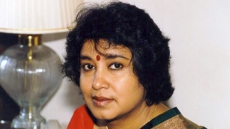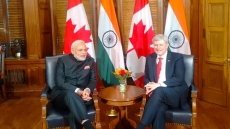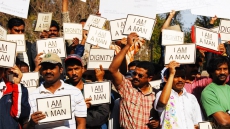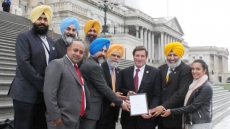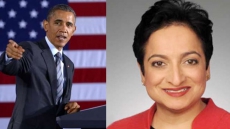OTTAWA — The Harper government's decision to join a U.S.-led military training mission Ukraine has drawn a sharp rebuke from Russia.
Canada is sending at least 200 members of the Canadian Forces to take part in a two-year deployment to improve the combat skills of troops in the embattled eastern European country.
In a statement, the Russian Embassy in Ottawa calls that "counterproductive and deplorable."
It says the move does nothing to resolve the fracturing of Ukraine and that Canada should concentrate on diplomacy and political dialogue with the breakaway eastern regions of the country.
The Russians also accuse Canada and the West of assisting in the military buildup and playing into the hands of the "party of war" in Kyiv.
Defence Minister Jason Kenney says the Canadian trainers will out of harm's way, some 1,300 kilometres from the restive districts of Ukraine.
There, as many as 6,000 people have been killed in fighting between pro-Russian separatists and government forces.
The Canadians — along with U.S. and British forces — will train Ukrainian soldiers and national guard troops in the finer points of modern combat, including how to defuse roadside bombs.
A spokesman for Prime Minister Stephen Harper said "Canada has demonstrated unyielding support for Ukraine in the face of ongoing aggression by the Putin regime."
"Putin's failure to end his support to armed rebel groups and his occupation of Ukranian sovereign territory constitutes a real threat to international peace and security," Stephen Lecce said in an email.
Defence expert Steve Saideman of Carleton University, said earlier this week that the training mission likely won't raise the political temperature of the conflict in eastern Europe, but he predicted the Russians would complain and use it for propaganda value.
The comment came on the same day as the Foreign Affairs Department released heavily censored briefing records that show Canadian diplomats struggled last spring about how to respond to Russia's annexation of Crimea and the growing unrest in Donetsk.
An information memo sent to former foreign affairs minister John Baird and International Trade Minister Ed Fast noted with concern the rapidly deteriorating security situation in eastern Ukraine. It said development aid or economic assistance required stability in the region.
Even with the fighting in full swing, assistance and diplomacy were still relevant, it said, but they would have to be measured.
"Short-term interventions, if appropriately focused and well-conceived, can buy time on the ground and build momentum for change, but it will not bring the type of dramatic and systemic change necessary," said the May 8, 2014 briefing, obtained by The Canadian Press under access to information legislation.
The documents show the federal government was considering backing enhanced freedom-of-religion initiatives and even sprinkling small amounts of cash in the conflict zones to help offset the social devastation.
"An increased Canada Fund for Local Initiatives allocation for the embassy of Canada in Ukraine this fiscal year — along with the necessary human resources required to implement a wide variety of local initiatives in eastern Ukraine — could be pursued," said the note. "The CFLI could support goodwill programming for the socially disadvantaged (e.g. pensioners and orphans) but could also support non-governmental organizations working for democracy in eastern Ukraine."

